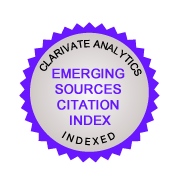INDONESIAN, MALAYSIAN AND THAI SECONDARY SCHOOL STUDENTS’ WILLINGNESS TO COMMUNICATE IN ENGLISH
DOI:
https://doi.org/10.32890/mjli2020.17.1.1Keywords:
ESL, EFL, interlocutors, secondary school, willingness to communicateAbstract
Purpose – This quantitative study explored willingness to communicate (WTC) across two settings, ESL in Malaysia, and EFL in Indonesia and Thailand. Participants’ WTC levels were measured and communicative situations in which participants were almost always willing and almost never willing to communicate in English were identified.
Method – Convenience sampling was used to select the three countries, four secondary schools and 42 intact classes. Two schools were in Malaysia, while one school each was in Indonesia and Thailand. A total of 1038 participants, consisting of 291 Malaysians, 325 Indonesians and 422 Thais took part in the study. The instrument used was an adapted questionnaire measuring WTC inside and outside the English classroom.Findings – The major findings were: 1) Situations in which students were almost never willing to communicate in English were mainly found outside the classroom; 2) Students were almost always willing to communicate in English in brief, predictable situations requiring the use of set phrases; 3) ESL students had a higher level of WTC than EFL students; and 4) WTC inside the classroom was significantly higher than WTC outside the classroom. Significance – The findings have implications for ESL/EFL classroom instruction. English teachers remain the main interlocutors in increasing WTC in the classroom. They also need to bridge the gap between the classroom and the outside world by preparing students for real social situations. This is consistent with the situation-specific aspect of WTC in the heuristic model proposed by MacIntyre, Clément, Dörnyei, & Noels (1998).
Metrics
Metrics Loading ...
Additional Files
Published
31-01-2020
How to Cite
Tan, K. E., Abdullah, M. N. L. Y., Abdullah, A., Ahmad, N., Phairot, E., Jawas, U., & Liskinasih, A. (2020). INDONESIAN, MALAYSIAN AND THAI SECONDARY SCHOOL STUDENTS’ WILLINGNESS TO COMMUNICATE IN ENGLISH. Malaysian Journal of Learning and Instruction, 17(1), 1–24. https://doi.org/10.32890/mjli2020.17.1.1
Issue
Section
Articles




























